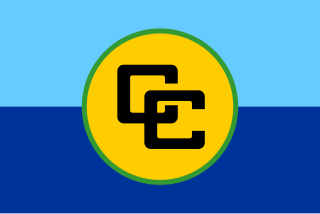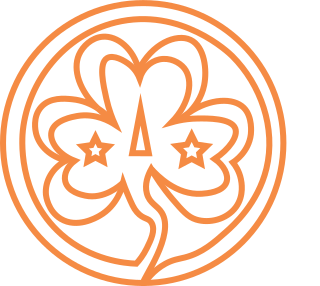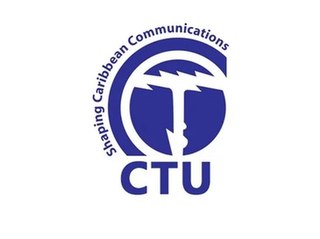
The Caribbean Community is an intergovernmental organisation that is a political and economic union of 15 member states and five associated members throughout the Americas and Atlantic Ocean. It has the primary objective to promote economic integration and cooperation among its members, ensure that the benefits of integration are equitably shared, and coordinate foreign policy. The organisation was established in 1973, by its four founding members signing the Treaty of Chaguaramas. Its primary activities involve:

The British West Indies (BWI) were colonised British territories in the West Indies: Anguilla, the Cayman Islands, Turks and Caicos Islands, Montserrat, the British Virgin Islands, Antigua and Barbuda, The Bahamas, Barbados, Dominica, Grenada, Jamaica, Saint Kitts and Nevis, Saint Lucia, Saint Vincent and the Grenadines, British Guiana and Trinidad and Tobago. Other territories included Bermuda, and the former British Honduras.

The Regional Security System (RSS) is an international agreement for the defence and security of the eastern Caribbean region with future expansion planned with South America.

The Caribbean Free Trade Association (CARIFTA) was an English-speaking economic trade organisation. It organised on 1 May 1968, to provide a continued economic linkage between the English-speaking countries of the Caribbean. The agreements establishing it came following the dissolution of the West Indies Federation, which lasted from 1958 to 1962.
The Athletics Competition at the 1995 Pan American Games was held in Mar del Plata, Argentina between 17 and 25 March.

The CARICOM passport is a passport document issued by the 15 member states of the Caribbean Community (CARICOM) for their citizens. It can be used both for intra-regional and international travel. The passport was created to facilitate intra-region travel; however, citizens of the OECS that are citizens from Antigua and Barbuda, Dominica, Grenada, St. Kitts and Nevis, Saint Lucia, Guyana and St. Vincent and the Grenadines may use a member-state issued drivers licence, national identification card, voters registration card or social security card for travel within the OECS area.

The CARICOM Regional Organisation for Standards and Quality (CROSQ) is a regional standards body for the Caribbean Community CARICOM bloc of countries.
The nation of Barbados has been a supporter of the Caribbean Community (CARICOM). Barbados was one of the four founding members in 1973 which then along with Guyana, Jamaica, and Trinidad and Tobago moved to establish the organization then known as the Caribbean Community and Common Market. This new organization became a successor to the Caribbean Free Trade Association (CARIFTA) of which Barbados was also a member.

The Partnership for Prosperity and Security in the Caribbean (PPS) is a regional-level dialogue with the stated purpose of providing greater cooperation on security and economic issues. The Partnership was founded in Bridgetown, Barbados on March 10, 1997 by the Governments of the United States of America, Antigua and Barbuda, the Commonwealth of The Bahamas, Barbados, Belize, the Commonwealth of Dominica, the Dominican Republic, Grenada, the Co-operative Republic of Guyana, the Republic of Haiti, Jamaica, the Federation of St. Kitts and Nevis, Saint Lucia, St. Vincent and the Grenadines, the Republic of Suriname and the Republic of Trinidad and Tobago.

The Caribbean Link for Guiding is a consortium of 21 Girl Guide Associations from throughout the Caribbean. These include associations from independent countries as well as from British Overseas Territories, coordinated by Girlguiding UK. It was created in 1958.
The 2011 CONCACAF U-17 Championship qualification tournaments took place in 2010 to qualify national teams for the 2011 CONCACAF U-17 Championship.
The nation of Trinidad and Tobago has been the leading supporter of the Caribbean Community (CARICOM). Trinidad and Tobago was one of the four members in 1973 which then along with Barbados, Guyana and Antigua and Barbuda moved to establish the organisation that today it known as the Caribbean Community and Common Market. The new organisation because a successor to the Caribbean Free Trade Association (CARIFTA) by the Treaty of Chaguaramas, of which Trinidad and Tobago was a leading member and also a founding member.
The Methodist Church in the Caribbean and Americas is a Methodist denomination in Anguilla, Antigua and Barbuda, Aruba, the Bahamas, Barbados, Belize, Bonaire, the British & the US Virgin Islands, the Cayman Islands, Costa Rica, Curaçao, Dominica, Grenada, Guyana, Haiti, Honduras, Jamaica, Panama, Saint Kitts and Nevis, Saint Lucia, Saint Martin, Saint Vincent and the Grenadines, Sint Eustatius, Trinidad and Tobago, and the Turks and Caicos Islands. The Connexion is divided into eight districts:
The Caribbean Agricultural Research and Development Institute (CARDI) carries out research and development for agriculture in the Caribbean region. Its headquarters are on the campus of the University of the West Indies (UWI), at St. Augustine in Trinidad and Tobago and it also has national offices throughout the region.
The Dominica national football team represents Dominica in international football under the control of the Dominica Football Association (DFA). Although a Dominica representative team had played previously, the football association was founded in 1970. It became fully affiliated to FIFA and CONCACAF in 1994.
The Saint Lucia national football team represents Saint Lucia in international football under the control of the Saint Lucia Football Association (SLFA). Although a Saint Lucia representative team had played previously, the football association was founded in 1979. It became fully affiliated to CONCACAF in 1986 and joined FIFA two years later.
The Saint Lucia women's national football team is the representative women's association football team of Saint Lucia. Its governing body is the Saint Lucia Football Association (SLFA) and it competes as a member of the Confederation of North, Central America and Caribbean Association Football (CONCACAF).
The following lists events that happened during 2022 in the Caribbean.

The Caribbean Telecommunications Union (CTU) is an intergovernmental organization established by CARICOM in 1989, to facilitate development of the telecommunications sector in the Caribbean.
2. www.caricom.org
 Antigua and Barbuda : Gaston Browne
Antigua and Barbuda : Gaston Browne  Bahamas : Philip Davis
Bahamas : Philip Davis  Barbados : Mia Mottley
Barbados : Mia Mottley  Belize : Johnny Briceño
Belize : Johnny Briceño  Dominica : Roosevelt Skerrit
Dominica : Roosevelt Skerrit  Grenada : Dickon Mitchell
Grenada : Dickon Mitchell  Guyana : Mohamed Irfaan Ali
Guyana : Mohamed Irfaan Ali  Haiti : Ariel Henry
Haiti : Ariel Henry  Jamaica : Andrew Holness
Jamaica : Andrew Holness  Montserrat : Easton Taylor-Farrell
Montserrat : Easton Taylor-Farrell  Saint Kitts and Nevis : Terrance Drew
Saint Kitts and Nevis : Terrance Drew  Saint Lucia : Philip Pierre
Saint Lucia : Philip Pierre  Saint Vincent and the Grenadines : Ralph Gonsalves
Saint Vincent and the Grenadines : Ralph Gonsalves  Suriname :Chan Santokhi
Suriname :Chan Santokhi  Trinidad and Tobago : Keith Rowley
Trinidad and Tobago : Keith Rowley 






